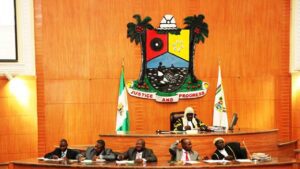
2020 FY: Zenith Bank, GTBank, UBA, 8 others cross N50trn in total assets
…Customers deposit contributes 69%
…hike in total assets does not translate into economy growth — Prof. Ajibola
…CBN’s 65% LDR drive lending to real sector — Analysts
By Kayode Tokede
Amid growing deposit and loans & advances to customers, a total of 11 banks operating in the country crossed N50trillion in total assets as gathered by Nigerian NewsDirect in their financial year results for period ended December 31, 2020.
These 11 banks, according to our correspondent findings reported a total of N50.9trillion in total assets in 2020 as against N39.98trillion reported in 2020.
Further findings by correspondent revealed that customers’ deposit of these 11 banks contributed 69per cent of total assets in year under review.
Analysts have attributed the growth in total assets to Central Bank of Nigeria (CBN) 65 per cent Loan-to-Deposit (LDR) policy that drive lending to real sector.
They added that the low yield in money market instruments also attracted more savings in the banking sector, leading to growth in customers’ deposit.
Nigerian NewsDirect gathered that Ecobank Transnational Incorporated (ETI), a pan-African bank has the highest total assets among these banks, reporting an increase of 20.4 per cent to N10.38trillion in 2020 from N8.62trillion reported in 2019.
Following ETI is Zenith Bank Plc with N8.48trillion in total assets in 2020, 33.6 per cent growth over N6.3trillion reported in 2019.
United Bank for Africa Plc (UBA) and First Bank Holdings plc crossed N7.6trillion in total assets in 2020.
UBA in 2020 reported 36.95per cent growth in total assets to N7.69trillion from N5.62trillion in 2019 while FBN Holdings closed the year at N7.6trillion, 22.9 per cent above N6.2trillion reported in 2019.
Among tier-1 banks operating in the country, Guaranty Trust Bank plc (GTBank) has the lowest total assets with N4.9trillion in 2020, 31.5 per cent increase from N3.76trillion reported in 2019.
From the six tier-2 banks, Fidelity Bank Plc leads the chart with N2.7trillion in total assets as reported in its unaudited results for full year ended December 31, 2020 from N2.11trillion.
Stanbic IBTC Holdings came second with N2.49trillion in total assets in 2020 from N1.87trillion in 2019, followed by Union Bank of Nigeria (UBN) with N2.19trillion in total assets from N1.87trillion reported in 2019.
FCMB Holdings grew its total assets by 23. 4per cent to N2.06trillion in 2020 from N1.66trillion in 2020 while Sterling bank Plc closed 2020 with N1.3trillion in total assets, 10 per cent increase over N1.18trillion reported in 2019.
In addition, Wema Bank in its unaudited results reported N986.6billion in total assets from N715.8billion reported in 2019.
Speaking with our correspondent, the former President/Chairman of Council, Chartered Institute of Bankers of Nigeria (CIBN), Prof. Segun Ajibola, said the hike in banks total assets might not impact much on economic growth.
He attributed this to financial problems in the country.
In his words, “Banks act like financial intermediary and when you mentioned total assets, we must understand that it comprises of customers deposits, among other components.
“The loan portfolio of banks is around 60-70 per cent of total assets.
“As you likely know in recent times, we had a lot of activities that pushed up loans and advances to customers. The CBN introduced LDR 65 per cent that impacted on loans to customers.
“We had mobile banking deployments that encouraged growth in deposit.
“However, the way it can impact on economic growth, can only be if there is transmission from monetary system to real sector.
“For the real sector, those that benefited from these loans have their problems in transmitting loans to effective use because some of them are hampered by financial problems.
“Specifically, problem of power, security and factory closure due to COVID-19 lockdown, among others. All these will delay transmission from the monetary to real sector.
“That is why the impact on economic growth cannot be felt immediately. The impact of growth in total assets might not even reflect at all due to these problems.
“It is very important to solve all these problems so that growth in banks total assets can drive economy growth. You don’t solve one and leave the other because the unsolved problems will make a mess of the solved problems.
“That is why you will notice increase in banks non-performing loans increasing because some of obligors are unable to honour their obligations because they encounter some financial problems in mentioned earlier.”
President, Bank Customers Association of Nigeria (BCAN), Dr Uju Ogubunka, stated that growth in loans & advances translates growing lending to economic development.
He explained further that, “if the loans to agriculture are effectively utilized, it will translate into growth in GDP, jobs creation and food provision, among others. Supposing the funds borrowed, are invested into infrastructure that will also help in economy growth.
“Are these lending to real sectors performing under the circumstances we find ourselves? Banks’ total assets are growing, whether this is contributing to economy growth is a different thing.
“The effective utilisation of these assets matters in the way it is invested in the nation’s economy. If these assets are utilized into SMEs and manufacturing sectors, I think it will impact on the economy development.”
CEO, Enterprise Stockbrokers Plc, Rotimi Fakayejo said the impact can only be translated into the economy in a bigger proportion once other macroeconomic challenges are tackled.
Speaking from a different perspective, an analyst, Mr. Wole Adeyeye attributed growth in banks’ total assets in 2020 to financial inclusion, stressing that economy situation in the country also drive total assets.
According to him, “Most banks customers decided to save their money over low yield in the money market. The CBN introduction of LDR policy has impacted on banks’ lending to real sector of the nation’s economy. The numerous CBN’s intervention and funds disbursement went through banks.
“All these have contributed to Nigeria exiting recession last year. If banks loans and advances are improving, it actually means banks are lending to real sector.”



